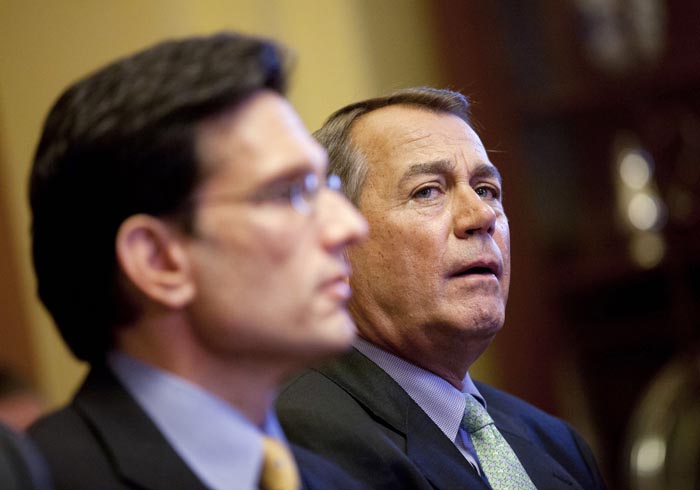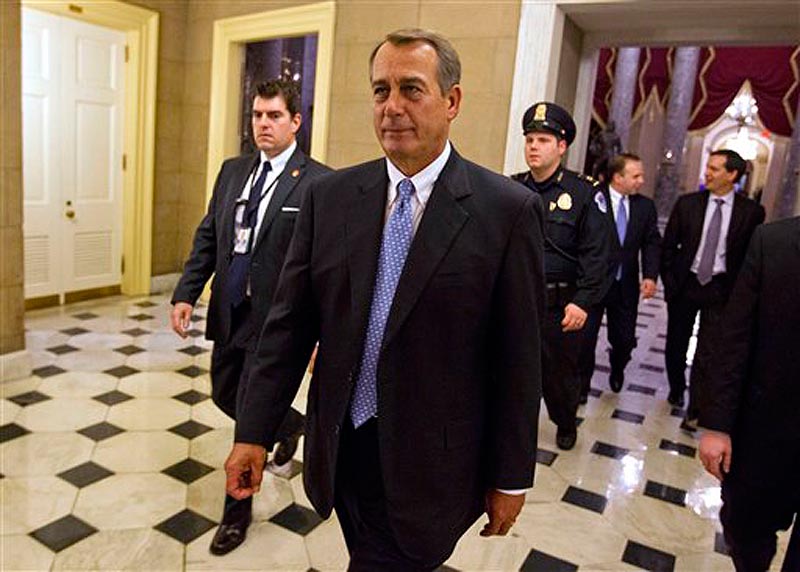WASHINGTON — Careening toward a politically toxic tax hike, President Barack Obama implored House Speaker John Boehner today to get behind a two-month stopgap until a longer deal could be struck early next year, calling it the only real way out of a mess that is threatening the paychecks of 160 million workers and isolating House Republicans.
In a weary Washington, the outreach accomplished little. All sides seemed to end the day where they began, with heavy political and economic consequences at stake.
Boehner remained insistent on a full-year extension of the existing payroll tax cut before Jan. 1, urging Obama to haul Senate Democrats back to town to talk to his chosen negotiators. “Let’s get this done today,” Boehner told Obama, according to a speaker’s aide, who required anonymity to characterize a private conversation.
But the Capitol was emptying out fast, and the Senate showed no inclination to return, having already passed a bipartisan two-month tax cut it thought had settled the matter.
For taxpayers, and for an economy starting to show some life again, the standoff was all holiday gloom.
Barring any action by Congress, Social Security payroll taxes will go up almost $20 a week for a worker making a $50,000 salary — that’s $40 less for a typical paycheck or $1,000 over the whole year. Almost 2 million people would lose unemployment benefits as well.
The political risks seemed only to deepen, too, particularly for House Republicans. They appeared poised to take the biggest blame for a tax increase even while pushing for a deeper one.
The reliably conservative editorial page of The Wall Street Journal blasted both Boehner and Sen. Mitch McConnell, the GOP leader, for how they handled the matter. “The GOP leaders have somehow managed the remarkable feat of being blamed for opposing a one-year extension of a tax holiday that they are surely going to pass,” the paper’s editorial said.
In a year of legislative brinksmanship remarkable even by Washington standards, the latest fight spilled into the lap of Republican candidates running for president.
Former House Speaker Newt Gingrich chastised Congress, particularly the Senate, for failing to extend the 2 percentage point tax cut for a full year.
“They can’t figure out how to pass a one-year extension, so the Senate leaves town?” Gingrich remarked while campaigning in Iowa. “It’s an absurd dereliction of duty.”
Rival Mitt Romney refused to take a position, again steering clear of Washington’s hot policy debate.
“I’m not going to get into the back-and-forth on the congressional sausage-making process,” the former Massachusetts governor told reporters after events in New Hampshire. “I hope they’re able to sit down and work out a solution that works for the American people.”
But the White House made clear the time for talks were over for this year.
“The negotiating has happened already,” presidential spokesman Jay Carney said, referring to the Senate bill the White House insists was sealed with Boehner’s blessing.
Boehner disputes that he ever gave a nod of support to the two-month tax cut that many in his caucus oppose.
He and other House members call it a poor and unworkable tax policy.
Obama also called the Senate’s Democratic leader, Harry Reid, and praised him for the bipartisan tax-cut bill with McConnell that passed the Senate.
Obama did most of the talking in his 10-minute call to Boehner.
The president made clear to Boehner that this was essentially his last legislative chance: There was no other option under consideration except the two-month tax bill, no surprise last-minute deal, and no real chance that Reid was calling the Senate back, according an administration official who spoke anonymously to describe the private phone call.
From Boehner’s perspective, the only real progress was that Obama had shown engagement with the speaker that he had not in weeks, according to an aide who also spoke anonymously to describe internal thinking.
Obama for months has called for a year-long extension of the tax cut; he would prefer that it be deepened, too, although that idea never went anywhere in Congress.
The stalemate has centered on how to pay for another year’s tax cut without adding to the deficit. That is the debate ahead — if the two-month deal gets done first.
Boehner’s reaction gave no hints of a breakthrough, even though House Republicans appear increasingly isolated. They’re not getting support from Senate Republicans and are battling against a president whose approval numbers, while not impressive, are better than theirs.
Earlier today, the combatants on Capitol Hill continued to fight over a battleground that’s already well worn.
Reid started with a letter to Boehner urging him to bring House lawmakers back to Washington — most have left by now — and approve the bipartisan Senate measure. Reid said he was fully confident Congress could agree on a year-long tax extension, but not before the House acts to prevent a tax increase on Jan. 1.
Minutes later, Boehner and other top House Republicans invited reporters into a meeting where they urged Reid to bring senators back to town so they can negotiate over a yearlong extension of the tax cut and jobless benefits. The bill would also postpone a scheduled Jan. 1 cut of 27 percent in payments to doctors who treat Medicare patients.
“All we’re asking for is to get Senate members over here to work with us,” Boehner said.
In a moment of political theater, Democrats tried to get the House to consider the two-month extension of the payroll tax cut as the chamber convened for a ceremonial session at which no formal business was scheduled. But acting speaker Rep. Michael Fitzpatrick, R-Pa., adjourned the chamber and walked out.
Obama was to have left Washington by now for a Christmas vacation in Hawaii, where his wife and two daughters have been since the weekend.
Instead, after speaking to Boehner and Reid, he found a different escape from the White House.
He took his dog, Bo, and went holiday shopping.
Send questions/comments to the editors.




